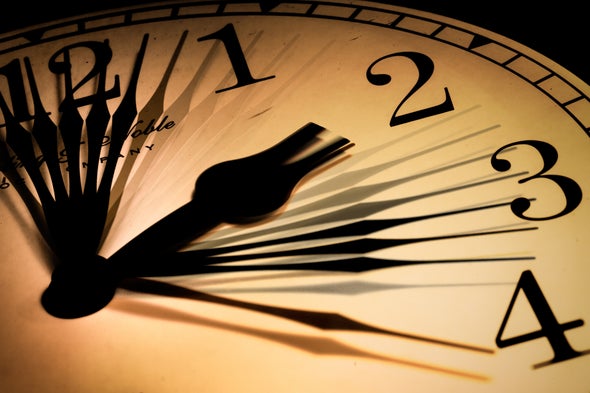
FASTER AND FASTER
It’s an age-old question: “Where did the time go?”, middle-aged and older adults often ask. We all know that the clock does not tick faster as we age, but it sure feels otherwise. As a young boy, I vividly recall that the wait between Christmases felt like an eternity whereas, in my adult life, the years seem to fly by at a dizzying speed. I’m surprised that we are already approaching the end of another year and astonished that over 20 years have passed since Sydney hosted the Olympic Games.
Unravelling the mystery of the perceived difference between clock time and mind time has been the focus of several investigations. These studies have produced various theories explaining why time seems to move at a leisurely pace in childhood but whizzes by in adulthood. While there is no consensus on the cause, it’s clear that the illusion of time slipping away faster and faster as the years go by is a common experience.
The passage of time – hours, days, and years – ticks by at a constant rate, no matter what. However, according to neurologist and neuroscientist, Dr Santosh Kesari, “most (adults) feel that time elapsed slowly in their earlier days, but then speeds up later in life”. This perception, Kesari posits, may be due to the fact that when we’re children, a year of life amounts to much more time of existence, percentage wise.
For a two-year-old, a year is half of their life, which is why it seems such an extraordinary long period of time between birthdays. “For a 10-year-old, one year is 10 per cent of their lives,” Kesari notes, whereas “for a 60-year-old, one year is less than two per cent of their lives”.
We perceive a period of time as the proportion of time we have already lived through (the so called “ratio theory”). Given this, it’s not surprising that time appears to accelerate as we grow older because our sense of the present feels short compared to our total lifespan. It also helps explain why kids on car trips constantly ask that most annoying of questions: “Are we there yet?”. A car journey actually feels longer to kids than it does to adults.
Furthermore, when we were children, the world was an unfamiliar place replete with new experiences and wonderment. Can you remember your surprise and delight when you encountered something for the first time? Your first ice cream, first trip to the beach, first kiss, and so on? We were always being introduced to novel things and ideas and our young brains took longer to process the large amounts of new stimuli and this left lasting impressions on our memories.
As Kesari observes: “We gauge time by memorable events and fewer new things occur as we age to remember, making it seem like childhood lasted longer”.
This paucity of novel experiences also has relevance to the coronavirus pandemic. During the COVID-19 restrictions, some people reported that their days in lockdown seemed to slip by faster than usual. This was a surprising outcome as those under stay-at-home directives thought that their time in isolation would be characterised by boredom. Yet anecdotally and unexpectedly, people found that their days passed quickly under the dull weight of monotony.
Variety may be the spice of life, but it is also the substance of memory. As most people spent their entire time in COVID-19 lockdown in one location, they made fewer memories than normal and therefore experienced the sensation that time had hurtled by.
Commenting on the lack of novel experiences while hunkering down at home, Marc Wittmann, a research fellow at the Institute for Frontier Areas in Psychology and Mental Health in Freiburg, Germany said: “When we look back at those days and weeks where not much happened – where it’s the same every day – not much is stored in memory and time feels [as though it has] passed very quickly”.
Thus, the passage of time we perceive is related to the amount of new perceptual information we absorb. This helps explain the “slow motion perception” often reported in the moments before an accident. The unfamiliar circumstances mean that there is a lot of new information to take in. In adulthood, we experience much less novelty or surprise than in our childhood and this provides another theory for time’s rapid pace as we get older.
It is believed that our biology plays a role as well, particularly our metabolism. Our metabolism slows as we get older, as does our breathing and heartrate. A faster metabolism may mean experiencing more biological markers, which may influence the passage of time, making life appear more vivid and slower moving, whereas less biological markers might degrade vibrancy somewhat.
Of course, we all know that times flies when we’re having fun and drags when we’re bored, and this is another factor in time’s perceived passage. The activity that we’re engaged in – and whether it’s a positive or negative experience – impacts our perception of time. In trying to explain his Special Theory of Relativity, Albert Einstein is alleged to have said: “Put your hand on a hot stove for a minute and it seems like an hour. Sit with a pretty girl for an hour and it seems like a minute. That’s relativity.”
Another explanation of this phenomenon is provided by psychology writer, Claudia Hammond, in her book, Time Warped: Unlocking the Mystery of Time Perception. Hammond coined the term, “vacation paradox”, to explain the subjective experience of how time flies when you’re having an enjoyable experience like an action-packed holiday, but then later, in retrospection, it feels like it lasted longer than it really did.
Our perception of time and our experience of passing minutes differ greatly according to circumstances. “A watched pot never seems to boil, but go and check your emails and it will be boiling over before you know it,” Hammond notes. She describes how time “stretches” and “shrinks” at different moments of our lives. Hammond writes:
… the experience of time is actively created by our minds. Various factors are critical to this construction of the perception of time – memory, concentration, emotion and the sense we have that time is somehow rooted in space. It’s this last factor that allows us to do something extraordinary – to time-travel at will in our minds, moving backwards and forwards in time.
Time is a psychological construct which is why the clock in your head moves at a different speed from the one on the wall. But you can slow down the pace of life – at least psychologically. Be sure to take advantage of new and unique experiences to create new memories, just as you did in your youth. Remember your teenage romances? It seemed like an eternity between those early telephone calls with your new love, whereas your wedding anniversary now flies by with regular monotony.
No wonder time passed slowly for Juliet while waiting for Romeo!
Regards
Paul J. Thomas
Chief Executive Officer
Ductus Consulting


Tick tock that naughty clock seems to accelerate as we age. As children life seemed so simple, as we age we try to juggle a multitude of competing priorities and as you rightly point time seems to go so quickly. Another excellent blog Paul! ⏰⏳🕰⏲
So true – moral of the story for adults is to always stay curious!
Note: I also think that the constant barrage of information from our device ridden world uses up all ‘spare’ time. Our two children, through the later years of their recent high school journey, kept commenting on how fast time was going – something that at their age I did not!
Time is definitely non-linear – just wish I had the brain cells to understand it!
Great blog Paul.
Hello Paul,
I appreciate this fascinating and engaging Blog article.
My learnings from your research include:
How new activities, events and experiences slow down our perception of time.
The importance of understanding ‘ratio time’ and;
The vacation paradox.
Action:
Check out that I am not currently in a rut!
Keep moving and find new projects
Respect time
Become more aware of the difference between real-time
and the perception of time.
Many thanks,
Des